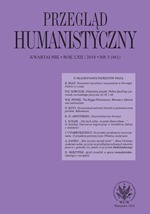Nacjonalistyczna Szwecja
Nationalist Sweden
Author(s): Karl-Olov ArnstbergSubject(s): History, Social Sciences, Language and Literature Studies, Cultural history, Studies of Literature
Published by: Wydawnictwa Uniwersytetu Warszawskiego
Keywords: Sweden; patriotism; nationalism; Swedishness; affiliation; national identity; history
Summary/Abstract: Karl-Olov Arnstberg in the text Swedish Patriotism discusses the issue of identity andnational consciousness in Sweden. The starting point for his reflections is the interview he had the opportunity to conduct with a doctor from Sri Lanka. He approached him as if he wasa Swede, they both had a similar worldview, but his approach changed when the subject ofconversation became the history of Sri Lanka. Arnstberg felt as if his interlocutor was sorooted in the past that the past, not the present created who he is now. The author of thetext notices a parallel linking this situation with how the national consciousness of theSwedes was described at the beginning of the previous century by Selma Lagerlöf and Vernervon Heidenstam. However, he notices certain regularity that “when the history of Sweden iswritten in a scientific and objective way, with a keen pursuit of truth, it is not only the historyof Sweden that loses its social grounding, but it is also much harder to build a nationalidentity on it”. What affects most the nation are fantastic heroes and fantastic events.Arnstberg emphasizes that he does not need his country’s history to build his identity. Herefers to Peter Englund, a member of the Swedish Academy, who on the one hand wrotethat ignorance of history may cause a lack of sense and identity, and on the other hand, hebelieved that historical events and heroes should not be used as justification for nationalism.His interpretation of Englund’s words includes two approaches to history. The first – modernist,which does not look at history in the identity context, and the second – nationalist,according to which knowledge of history is important for a sense of community with the restof the nation. Further, the author of the text analyzes the concept of Swedishness, referringto the articles of other researchers. The examples he gives more blur the term than allow us tounderstand what it really means. He demonstrates, on the basis of nationalism, the paradoxesof Swedishness and even undermines its existence.
Journal: Przegląd Humanistyczny
- Issue Year: 461/2018
- Issue No: 2
- Page Range: 61-68
- Page Count: 8
- Language: Polish
- Content File-PDF

